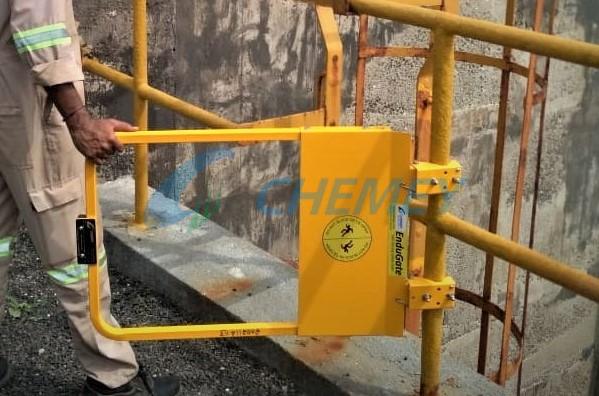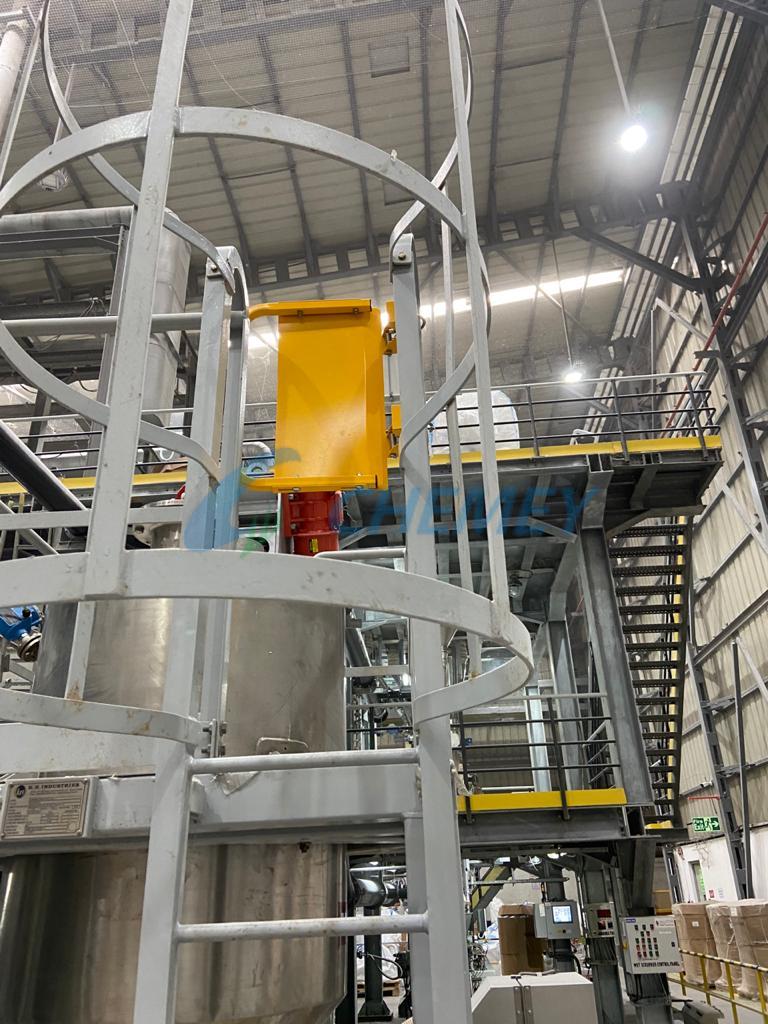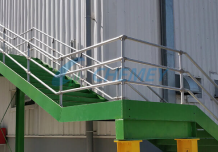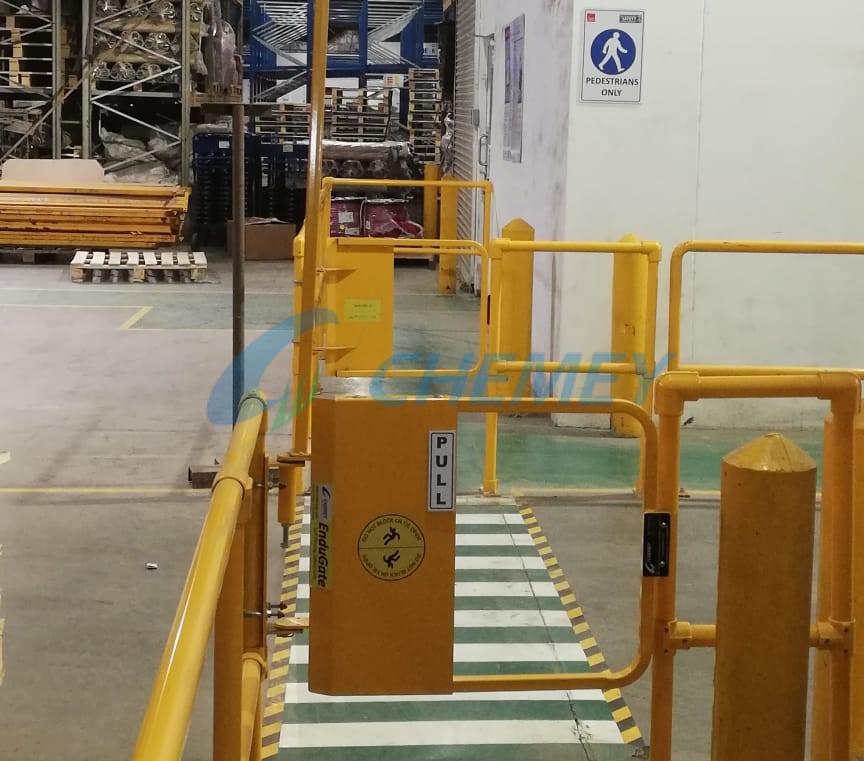The effects of the COVID-19 pandemic impacted every industry. Now that the economy has seen a significant rebound, manufacturing and oil & gas production are in full swing again. Safety measures are critical now more than ever, and particularly those pertaining to fall safety.
While addressing the danger of falls is critical in all workplaces, it’s a particular concern in chemical, oil/gas refinery, cement, and many other heavy manufacturing facilities. Continuous process facilities are bustling, structurally complex, and full of hazards subject to a variety of Safety regulatory requirements. There is dangerous equipment on-site, regular shipping and receiving through busy loading docks, and many elevated areas where fall risks are more present.

WHAT MAKES FALL SAFETY SO IMPORTANT?
Every accident has many consequences, the most important being that no employer wants to see workers hurt. Lack of safety compliance mean a potential work shutdown, and lost profits. Every slip, trip, and fall adds up to millions of lost workdays in a year. The independent survey estimates that about 20 percent of worker injuries in industry are due to slips, trips, and falls.
Proactively creating and supporting a culture of safety in your workforce is vital, but simply reminding workers to watch their step is not enough. Fall protection equipment, including specialized pieces such as an adjustable safety gate or swing gate, is essential for ensuring worker safety and keeping production moving. To help you to understand and implement proper fall protection, let’s examine the top fall risk areas in industry/refinery facilities, then consider if your company has fully addressed each of those risks.
AREAS OF FALL RISKS IN WORKPLACES
A Manufacturing industry/ Refinery includes several important areas which present fall hazards. Regulations do not always specify which equipment you are required to use in each situation. But OSHA guidelines provide requirements that the gates and other equipment you choose must meet in each area:
LADDERS
Ladders, either portable or affixed, are a common fall safety risk which OSHA addresses under 1910.23 – Walking-working Surfaces: Ladders.
Each employer must look at situations where ladders are being used and identify the fall hazard associated with it. For example, fall protection is usually not required for a step ladder, but it will be if that step ladder is used on an elevated platform or in an area adjacent to an unprotected edge. Fixed ladders, like those commonly used in oil refineries, also need fall protection, like guardrails fitted with an industrial safety swing gate to provide access control and fall safety.
ROOFTOPS AND ROOF ACCESS AREAS
Workers may need to access your rooftop for maintenance, cleaning, or to perform work on rooftop machinery. Skylights, roof edges, and even stairways require protection to properly manage rooftop access. The railing and safety swing gate that protect each of these areas must have a height of 1050mm (plus or minus 75 mm) from the walking/working surface that they’re installed on. They must be capable of withstanding 90 kg of downward force upon the top rail without failure. They also require a smooth-finished surface that can’t snag worker’s skin, clothing, or equipment. You should also look at options which are non-penetrating, allowing you to place well-anchored gates and railings without damaging the integrity of your rooftops.
LOADING DOCKS
Loading docks are another busy area in a manufacturing plants / oil & gas refinery, and thus, another fall safety hazard. Fall protection for a loading dock usually comes in the form of a self-closing, adjustable loading dock safety gate system and thorough training of personnel, ensuring risk mitigation at a busy dock. The height and strength requirements for railings and gates in loading dock areas are the same as those for rooftop areas (see above).
STAIRWAYS
When a door or a gate opens on a stairway, there is a platform and the gate’s swing doesn’t interfere with workers on the stairs. An outdoor or indoor swing gate is ideal for this situation. Stairs must also be kept well-lit, dry, and free of debris, allowing maximum safety to workers as they move between the levels of your manufacturing/processing areas.
MEZZANINES
The extra storage space created by these elevated platforms is extremely useful in many facilities, but they also present falling hazards. The same strong railing and safety gate requirements for roofs apply to mezzanines, and toe boards may also be required to help prevent small objects from falling into work areas below. Specialized pallet safety gate made for mezzanine use are your best option for access to these areas
MACHINERY GUARDING
Safety swing gates are a great tool for controlling access and preventing falls around or onto the potentially dangerous machinery in your facility. They can also help keep unauthorized personnel out of restricted processing areas, improving plant security and protecting trade secrets.



WHY SAFETY GATES MATTER
The right safety gates will help employees, visitors, and contractors within your facilities to perform their function without fall and safely access the areas they need to.
As outlined above, your facility has many areas with potential fall hazards, and the right Industrial safety gate choice can make the difference between being ready for a return to full production without struggling with safety problems.
WHY SAFETY GATES ARE SUCH AN IMPORTANT SAFETY CONSIDERATION
Simply put, Safety Swing Gates are the simplest, most effectively way to safely control access to the many areas in your facility, and to protect personnel from the fall risks they may encounter in each area. OSHA compliant safety gates keep workers safe on elevated areas and at the openings of stairways, ladders, mezzanines, and loading docks. There are many different types of OSHA-compliant gates with a specific purpose.
Self-closing safety gates are passive fall protection, designed to automatically close every time the gate swings open. There is no risk of a worker forgetting to close the gate behind them. The equipment offers nearly continuous protection from leading edges. These gates are easy to mount in various positions and on handrails of all sizes.
CHOOSING A GOOD SAFETY PARTNER
Your worker safety requires the right choices in selecting and installing fall protection equipment, particularly safety gates. Therefore, it’s so important to pick a qualified supplier.
CHEMEY is a trusted leader in fall safety solutions for the refining and manufacturing industry. Our dedicated team is here to help you tackle all areas where fall protection equipment can assist in making your workplace safer. We provide the highest level of quality and reliability in both products and guidance. Contact us today to learn more about how we can positively impact safety in your industry.
Need help? Our team of professionals can guide you to find the ideal solution. We are there for you 24/7! Just call us on +91 79-26420786, +91 9099033711, +91 79-26427686 or email us: contact@chemey.com



